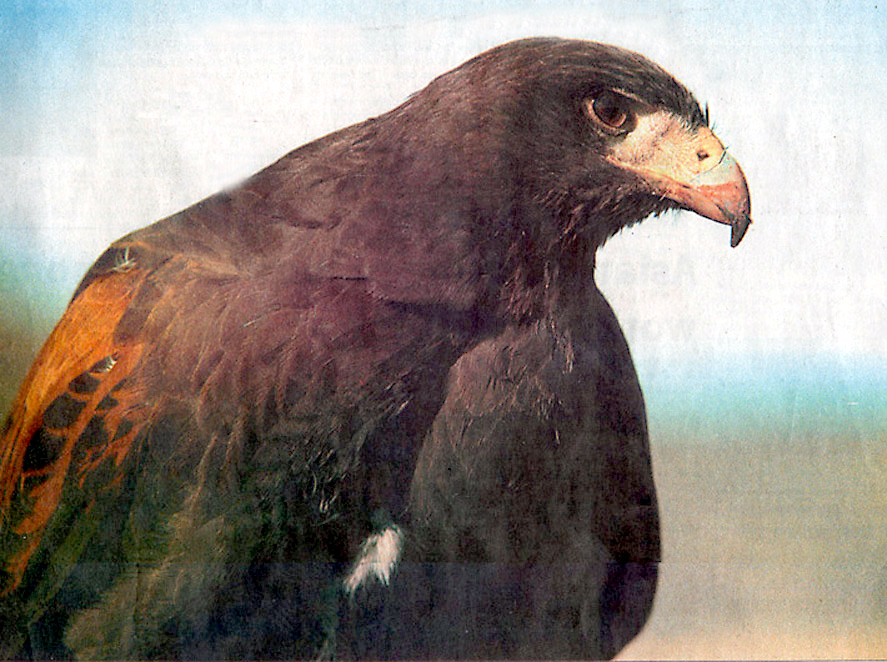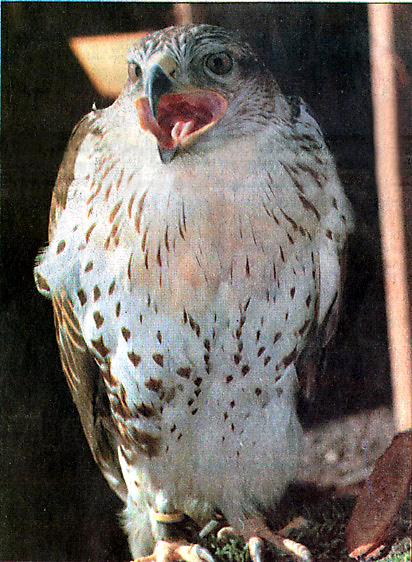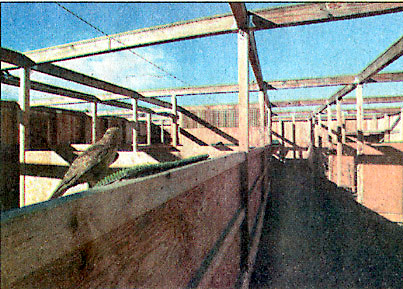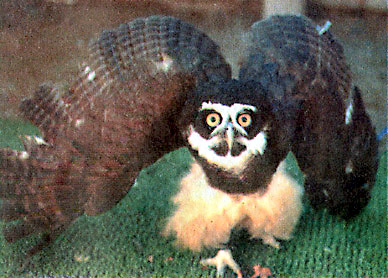The Castle Rock News-Press

HawkQuest teaches the public about birds of prey. One fact they tell their students is that Harris' Hawks hunt in groups. This Harris' Hawk just finished a meal. | |||||||||||
| This
Ferruginous Hawk is among the many birds cared for at HawkQuest. |  |
HawkQuest staff and volunteers with Harris' Hawks during a field program. HAWKQUEST Nonprofit group spends time educating students, Scouts about birds of prey, importance of preserving their environment. | |||||||||
| HAWKQUEST Story by Jennifer Simonson; photos by Evan Lewis If the Bald Eagle becomes extinct, will it still be our national symbol? That was one of the few questions Parker resident Kin Quitugua, a Master Falconer, has heard from elementary school students during the past 16 years that he was unable to answer. Quitugua is one of the founder of HawkQuest, a nonprofit organization that educates the public, mostly students and scout groups, about birds of prey, their environment and the importance of preserving that environment. With the help of his volunteers, Quitugua brings birds such as Eagles, Hawks, Owls, and Falcons into classrooms, allowing audiences to experience the birds up close. To demonstrate the birds' hunting ability, Quitugua brings students into the birds' natural habitat - the outdoors - and lets the birds do what they do naturally, he said. On November 19, Quitugua and six volunteers led 57 sixth-graders from West Middle School through Bear Creek Lake Park. Five volunteers with Harris' Hawks perched on their handler's glove walked the park searching the area for food. Two other HawkQuest members walked alongside them with large staffs hitting the ground and scrub brush to scare jackrabbits, or other potential food, from their hiding spots. |
A line of students, carefully stepping over scrub brush and cactus, followed. As the walk continued, some of the students were easily distracted, quietly talking about boys, teachers, and lunch. All attention, however was on the birds as soon as the Hawks spotted an animal and the chase began. The Hawks chased many animals that swerved to avoid their talons or scurried into a hole. During the two-hour walk, the birds killed two jackrabbits and a mouse. This was the 10th year HawkQuest has taken students from West Middle School out to observe the Hawk's hunting behavior. The program fits with the school's science curriculum, said teacher Steve Kidd. "Right now the students are learning about predator and prey relationships, habitat and animal adaptation and this field trip demonstrates all that," Kidd said. Quitugua runs HawkQuest from his home just outside Parker. A 40-foot by 80-foot mews, the Old English word for Hawk House, a garage and a bird shed fill his back yard. This mews is the biggest of its kind in Colorado. It houses 25 orphaned birds of varying species. Many of the birds at HawkQuest have been injured in some way - most were hit by a vehicle, leaving them unable to hunt and fend for themselves in the wild. Others were taken as pets while young and never learned how to hunt. |
In the corner stall, with her head hanging low, a 12-pound Bald Eagle named Spirit perched at the bottom of her cage. While taken as a pet, somebody fed her fish with high levels of mercury when she was young, Quitugua said. Because of mercury poisoning, which has caused brain and nerve damage, she now suffers from regular seizures. The human encroachment on open space, one of the reasons Quitugua explains to the students for bird extinction, is also endangering the organization. The rapidly expanding Denver-metro area is overtaking fields Quitugua used to exercise and demonstrate his birds, he said. Quitugua fears that if the trend continues, he might have to eliminate the field program from his teaching tools. If the students remember just a few facts from his presentation, such as that animals of prey have the upper hand in a hunt, that Harris' Hawks hunt in groups or that birds of prey have an extremely high mortality rate, he considers his program a success. But more importantly, Quitugua wants the students to walk away with an understanding about the environment and a sense of responsibility. As top predators, humans must take care of the environment they live in before it is no longer habitable, he said. | |||||||||
|
HawkQuest has a 40-foot by 80-foot mews. |
This Spectacled Owl also is part of the HawkQuest family. | ||||||||||
| Reprint from Castle Rock News-Press, November 27, 2002, Volume 1, Issue 37 | |||||||||||
Posted 12/2002




